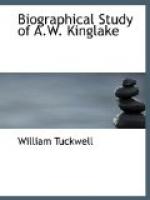Was the history of the Crimean War worth writing? Not as a magnified newspaper report,—that had been already done—but as a permanent work of art from the pen of a great literary expert? Very many of us, I think, after the lapse of fifty years, feel compelled to say that it was not. The struggle represented no great principles, begot no far-reaching consequences. It was not inspired by the “holy glee” with which in Wordsworth’s sonnet Liberty fights against a tyrant, but by the faltering boldness, the drifting, purposeless unresolve of statesmen who did not desire it, and by the irrational violence of a Press which did not understand it. It was not a necessary war; its avowed object would have been attained within a few weeks or months by bloodless European concert. It was not a glorious war; crippled by an incompatible alliance and governed by the Evil Genius who had initiated it for personal and sordid ends, it brought discredit on baffled generals in the field, on Crown, Cabinet, populace, at home. It was not a fruitful war; the detailed results purchased by its squandered life and treasure lapsed in swift succession during twenty sequent years, until the last sheet of the treaty which secured them was contemptuously torn up by Gortschakoff in 1870. But a right sense of historical proportion is in no time the heritage of the many, and is least of all attainable while the memory of a campaign is fresh. On Englishmen who welcomed home their army in 1855, the strife from which shattered but victorious it had returned, loomed as epoch-making and colossal, as claiming therefore permanent record from some eloquent artist of attested descriptive power. Soon the report gained ground that the destined chronicler was Kinglake, and all men hailed the selection; yet the sceptic who in looking back to-day decries the greatness of the campaign may perhaps no less hesitate to approve the fitness of its chosen annalist. His fame was due to the perfection of a single book; he ranked as a potentate in style. But literary perfection, whether in prose or poetry, is a fragile quality, an afflatus irregular, independent, unamenable to orders; the official tributes of a Laureate we compliment at their best with the northern farmer’s verdict on the pulpit performances of his parson:
“An’ I niver knaw’d wot a mean’d but I thow’t a ’ad summut to saay, And I thowt a said wot a owt to ‘a said an’ I comed awaay.”
Set to compile a biography from thirty years of “Moniteurs,” the author of Waverley, like Lord Chesterfield’s diamond pencil, produced one miracle of dulness; it might well be feared that Kinglake’s volatile pen, when linked with forceful feeling and bound to rigid task-work, might lose the charm of casual epigram, easy luxuriance, playful egotism, vagrant allusion, which established “Eothen” as a classic. On the other hand, he had been for twenty years conversant with Eastern history, geography, politics; was, more




